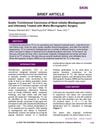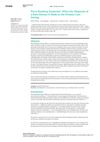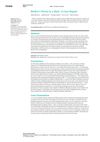
A 32-year-old man with early graying hair shows a unique pattern, suggesting more research is needed on why hair grays early.
 April 2024 in “ScienceRise. Pharmaceutical science”
April 2024 in “ScienceRise. Pharmaceutical science” Men with hair loss feel it affects their emotions and life quality, and want more effective treatments.
 February 2024 in “Benha Journal of Applied Sciences”
February 2024 in “Benha Journal of Applied Sciences” Androgenetic alopecia is common hair loss caused by genetics and hormones.
 February 2024 in “The Open dermatology journal”
February 2024 in “The Open dermatology journal” Alopecia Areata affects people of all ages worldwide, is likely caused by genetic and environmental factors, and can lead to stress and depression, highlighting the need for treatments that address both physical and mental health.
 December 2023 in “Research in pharmacy”
December 2023 in “Research in pharmacy” Phytotherapeutic compounds and supplements can help manage Polycystic Ovarian Syndrome (PCOS).

A neck lesion misdiagnosed as benign was later treated successfully with Mohs Micrographic Surgery.

Parry Romberg syndrome requires awareness and teamwork in primary care for proper diagnosis and management.
 October 2023 in “International Journal of Science and Research (IJSR)”
October 2023 in “International Journal of Science and Research (IJSR)” Early diagnosis of GLPLS is crucial to prevent complications, but scarring alopecia is irreversible.
 September 2023 in “Gynäkologische Endokrinologie”
September 2023 in “Gynäkologische Endokrinologie” Menopause causes skin and hair to become drier and thinner, but hormone therapy can improve these conditions.
 September 2023 in “Curēus”
September 2023 in “Curēus” A 21-year-old male has a benign skin condition called Becker's nevus, which he chose not to treat.

Different genes cause Female Pattern Hair Loss compared to male hair loss, and treatments vary, but more research is needed to understand it fully.
 June 2023 in “Medical records-international medical journal”
June 2023 in “Medical records-international medical journal” Decreased IGF-1R expression may contribute to sacrococcygeal pilonidal sinus development.
 June 2023 in “Brazilian Journal of Health Review”
June 2023 in “Brazilian Journal of Health Review” Common baldness is a hereditary condition that can be treated with medications or surgery to prevent progression and improve self-esteem.
 April 2023 in “IntechOpen eBooks”
April 2023 in “IntechOpen eBooks” Neuropathic pruritus is a commonly overlooked and wrongly diagnosed type of chronic itching that is hard to treat.
 March 2023 in “Journal of Cosmetic Dermatology”
March 2023 in “Journal of Cosmetic Dermatology” A woman's progressive hair loss was correctly diagnosed as a rare condition called fibrosing alopecia in a pattern distribution after initially being mistaken for a more common type.
 March 2023 in “International journal of trichology”
March 2023 in “International journal of trichology” Six genetic conditions are often linked to complete scalp hair loss in children.

Telogen effluvium is a hair loss condition that can be treated with medications like minoxidil.
 December 2022 in “Jurnal Kesehatan Jompa”
December 2022 in “Jurnal Kesehatan Jompa” AAG causes hair loss in many people, with limited treatments like finasteride, minoxidil, light therapy, and hair transplants.
 July 2022 in “Revista Científica de Estética e Cosmetologia”
July 2022 in “Revista Científica de Estética e Cosmetologia” Many treatments for hair loss from androgenetic alopecia are giving people satisfying results.
 May 2022 in “Benha Journal of Applied Sciences”
May 2022 in “Benha Journal of Applied Sciences” Higher levels of PD-L1 are linked to more severe hair loss in people with Alopecia Areata.
 April 2022 in “Research Square (Research Square)”
April 2022 in “Research Square (Research Square)” Long COVID recovery is hindered by smoking, with hair loss being a difficult symptom to treat.
January 2022 in “The Pan African medical journal” Hypertrichosis causes excessive hair growth and needs psychological support due to its impact on self-esteem.
 October 2021 in “International journal of basic and clinical pharmacology”
October 2021 in “International journal of basic and clinical pharmacology” Excessive eyelash growth from erlotinib may indicate positive tumor response and help treat madarosis.
 July 2021 in “CRC Press eBooks”
July 2021 in “CRC Press eBooks” Hair transplantation moves hair to bald areas and it should grow like it did before, but it's not a perfect cure for hair loss.
July 2021 in “Authorea (Authorea)” Graham-Little Piccardi Lassueur Syndrome is a rare skin condition with specific hair loss and skin symptoms.
 June 2021 in “Journal of dermatology and dermatitis”
June 2021 in “Journal of dermatology and dermatitis” Most dermatologists in Western Rajasthan prefer the anti-depressant Doxepin for elderly skin conditions and often refer patients to a psychiatrist.

Alopecia Areata has no cure, treatments are limited, and the condition often recurs, but new therapies like JAK inhibitors show promise.
 January 2020 in “Przegla̧d dermatologiczny”
January 2020 in “Przegla̧d dermatologiczny” The conclusion is that hirsutism in women can be managed with hair removal techniques, medications, and topical treatments.
 December 2019 in “Pubvet”
December 2019 in “Pubvet” The document concludes that atopic dermatitis in dogs is managed with various treatments including antipruritics, supplements, and possibly immunotherapy.
 November 2019 in “Harper's Textbook of Pediatric Dermatology”
November 2019 in “Harper's Textbook of Pediatric Dermatology” Understanding normal hair growth and loss in children is key to diagnosing and treating hair disorders.




























